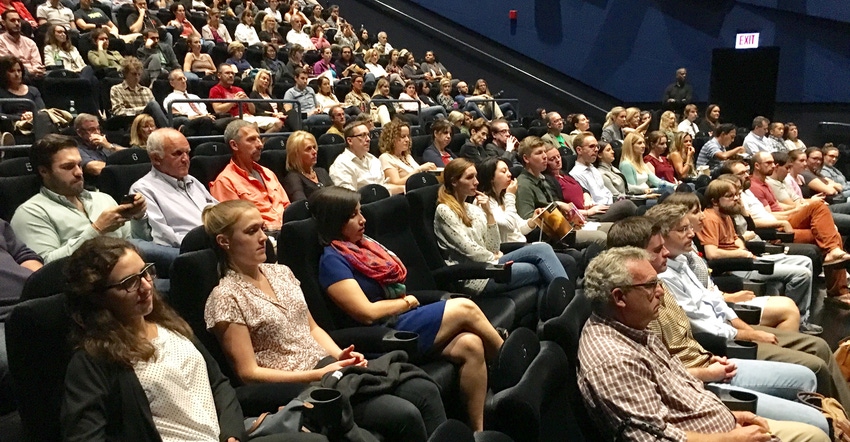
“Food Evolution.” Have you heard of it?
It’s the most recent movie proving that, with the right people in the right spaces, consumers can get positive, factual information about agriculture, science and technology — specifically, GMOs.
Director Scott Hamilton’s role was both creative and idea-driven. He spent months researching the idea that the world’s population will hit 9 billion by 2050, and that farmers will have to create more food in the next 30 years than they have in the last 10,000. “We researched and researched, and the GMO story was waving its hand,” he says.
With the film made, thanks to financial backing from the Institute of Food Technologists, U.S. Farmers and Ranchers Alliance entered the picture. Hamilton shared the film with USFRA, and its board loved it; USFRA decided to make a “significant financial investment” to promote the film and put Hamilton in front of key audiences.
“We were looking for something that could be brutally honest,” says Randy Krotz, USFRA chief executive officer, adding that the film looks back over 20 years of GMOs and at the people who have struggled to support the technology. “The film does a great job of that, and it looks at the fallacies surrounding technology in agriculture,” Krotz says.
He says the growing world population in relation to food supply is a serious conversation. “When you look at whether we can feed the world without modern agriculture, it would be very difficult. This film looks at that head on.”
The film is narrated by famed scientist Neil Degrasse Tyson, who Hamilton says did not take on the project to defend GMOs. “He’s very confident in the GMOs on the market. He took it on because if we don’t use science to make good decisions, it’s the beginning of the end of the democracy.”
Communicating science
Hamilton says consumers are capable of applying science to emotionally charged topics “if we can communicate with them.”
“We live in a time of memes and soundbites and social media sometimes spreading some really bad information,” he says, adding that confirmation bias happens in and out of science. “When a scientist only sees evidence that supports their hypothesis, instead of following evidence in the scientific process, that’s very dangerous.”
USFRA, now in its eighth year, was founded by U.S. commodity and farm organizations to bridge the gap between farmers and consumers by fostering an understanding about how food is grown and raised. While Krotz says GMOs have always been at the forefront of their conversations, he doesn’t believe they’ve found the “secret sauce” for communicating about GMOs.
“But getting people to watch this film is a core of getting them to understand science in agriculture,” he says. “Why get behind the film? I saw with my own eyes when an audience in Washington, D.C., shifted their views when they saw it. It caused them to seek more information from different sources.”
Krotz says USFRA focuses on food influencers, connectors and super influencers. And while the alliance doesn’t measure improvement in GMO views across all U.S. consumers, Krotz says consumers have become more polarized.
“That’s why we’re so excited about the film. It changes minds,” he adds.
Local showings
USFRA is encouraging farm groups to host viewings of the film. Illinois Farm Bureau has already hosted one in Chicago in early October, complete with a farmer panel afterward. The next screening will be held Nov. 27 at 7 p.m. in partnership with the DeKalb County Farm Bureau. It will take place at the Egyptian Theater in DeKalb, Ill., with doors opening at 6:30 p.m. A panel discussion about today’s agriculture will follow with:
• Lynn Byington, Leland farmer
• Jamie Walter, DeKalb farmer
• Joel Stafstrom, Ph.D., Northern Illinois University Department of Biological Sciences
• Kevin Folta, Ph.D., professor and chairman, University of Florida Horticultural Sciences Department (Illinois native, NIU grad)
Says Mike Orso, Illinois Farm Bureau, 14 additional county Farm Bureaus around Illinois have committed at this time to holding screenings for consumer audiences in their local communities. Dates and times will be available at a later date. He anticipates several collegiate Farm Bureaus in Illinois also coordinating screenings on campuses, and plans to work with USFRA to have “Food Evolution” shown at other Illinois colleges and universities.
“We’d be honored if we can look back and the film moved the needle,” Hamilton says. “Time will tell, but we’re seeing good signs that it will.”
Learn more at foodevolutionmovie.com.
About the Author(s)
You May Also Like






